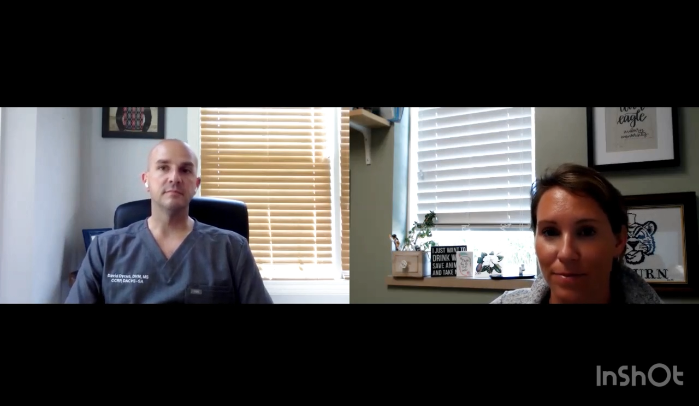I spoke with Dr. Dycus recently and he answered many of our clients most frequently asked questions. Dr. Dycus will be offering orthopedic services including TPLO surgeries at our hospital starting in September. Check out the video of our discussion as well! For more information on Nexus Veterinary Specialists or the Nexus Bone & Joint Center, visit nexusvet.com.
Q: Why can’t my regular veterinarian perform the same surgeries that you can? What is a veterinary surgeon?
A: While your regular veterinarian can handle most all of the day to day health care needs of your pet, there are times when speciality care is needed. For example, if you break a bone or tear your ACL your primary care physician will send you to an orthopedic surgeon to have it fixed. As a surgeon boarded by the American College of Veterinary Surgery, I have undergone additional training to offer specialized care to ensure your pet returns to the best function as possible. An individual that is an “ACVS Diplomate” or a “Veterinary Surgeon” has undergone a three-year residency program that meets specific training and case load requirements, and has performed research and had their research published. Once the residency is complete then an individual must sit for and pass a rigorous examination. Only after successful completion of the examination can an individual can call themselves a “Veterinary Surgeon”. It is important that if you regular veterinarian is recommending surgery by a surgeon, make sure that the individual is board certified by the American College of Veterinary Surgeons.
Q: If my dog is older, do they really need a TPLO for a torn cruciate?
A: There are many factors that go into decision making for surgery; in particular a TPLO. For me the goals are to restore the stability of the knee to improve comfort as well as allow your dog to maintain an active lifestyle, to slow down and minimize the progression of osteoarthritis that can develop after a torn cranial cruciate ligament. Older dogs especially need to live an active lifestyle and a TPLO is typically the best course of action to ensure this is possible. While no one knows how long any particular dog has left, it is important to ensure that they are comfortable and pain free even if they are older. Dr. Dycus has completed thousands of TPLOs, is the co-author on a textbook dedicated to addressing complications following knee surgery, is a laboratory instructor for the TPLO, and is often sought out internationally for second opinions regarding TPLO procedures.
Q: My vet is recommending that you perform a surgery on my pet. If I have questions or concerns after the surgery, can I contact you?
A: Absolutely, following surgery the Nexus team wants to continue to be involved with your pet. Our goal is to work with both you and your veterinarian to provide the best care specific to your dog or cat. Any questions or concerns can be directed to info@nexusvet.com.
Q: What are the most common orthopedic injuries in dogs?
A: There are a number of common orthopedic issues we see in dogs. The most common issue we see is a torn cranial cruciate ligament (CCL), which is similar to our ACL. The difference being that people tear their ACL due to a traumatic event whereas a dog tears their CCL due to degeneration or slow breakdown over time. The problem is we don’t know what causes this breakdown so there is progressive weakening until it becomes so weak that normal day to day activities will allow it to tear. We also commonly see developmental orthopedic issues in various joints that will lead to osteoarthritis later in life. For example, seeing dogs with hip dysplasia, or developmental elbow dysplasia (“elbow dysplasia”) or patella (kneecap) luxation is common. If we are able to diagnose these things early we can intervene surgically or conservatively to ensure a great pain free quality of life.
Q: Orthopedic surgery for a dog sounds expensive. Should I consider pet insurance?
A: While no pet owner wants to find themselves in a situation where the cost of their pets’ care plays a role it is always wise to be prepared. Pet insurance can be a valuable resource to have especially if bought early. I would recommend getting pet insurance for your pet as soon as possible, and it’s even better to start it when your pet is a puppy or kitten. Remember, that unlike in human healthcare pet insurance may not cover certain pre-existing conditions so it will not be helpful to try and get pet insurance after your pet has been diagnosed with an issue.




